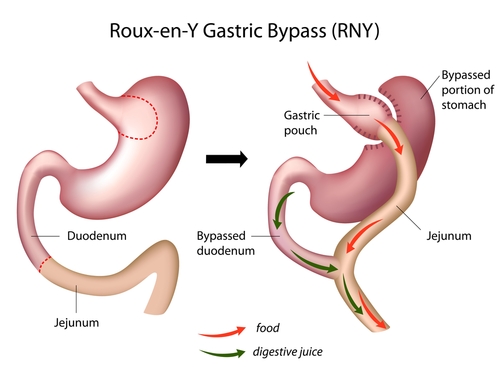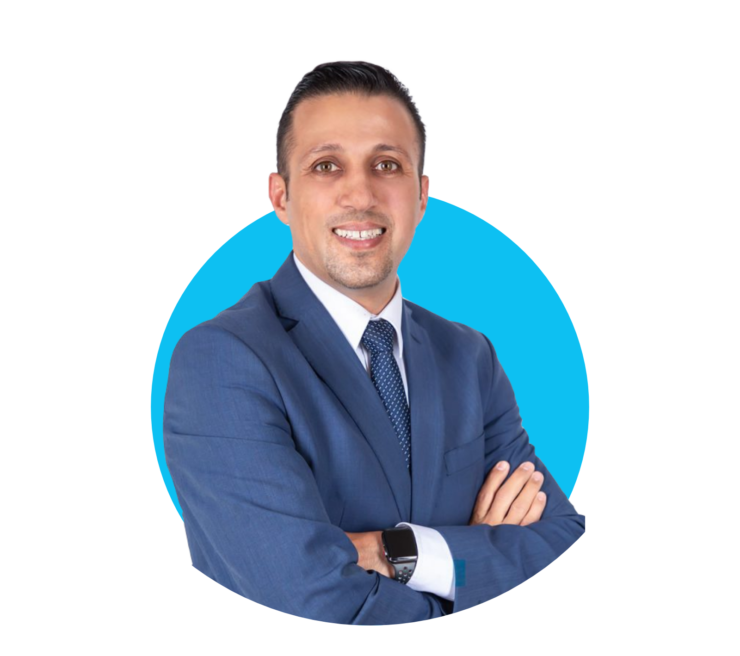Gastric Bypass Surgery in Dubai, Abu Dhabi and Al Ain
Gastric bypass is a bariatric procedure that helps patients lose excess weight and improve weight-related health issues. It works by making the stomach smaller and bypassing part of the intestines, which helps reduce your appetite and how much you eat.
Gastric bypass surgery (Roux-en-Y) can help you lose between 60% to 70% of your excess weight if you commit to a healthy lifestyle that includes dietary changes and regular exercising.
Some of the advantages of a gastric bypass are that it produces significant long-term weight loss and leads to favorable changes in gut hormones that reduce appetite and improve satiety (feeling full). Our bariatric team will be able to advise you whether you are a good candidate for gastric bypass surgery.
Am I a suitable candidate for gastric bypass?
Our specialist bariatric team at Novomed that includes a surgeon, dietitian and psychologist will discuss your options and help you determine the suitable procedure for you. You may be a good candidate for gastric bypass surgery if:
- You are over the age of 18.
- You have a BMI of 40 or higher.
- Your BMI is over 35, and you have other medical conditions such as type 2 diabetes or high blood pressure, which can be improved with weight loss.
- You have tried to lose weight by dieting and exercising but couldn’t get the desired result.
- You are fit enough to undergo anesthesia and surgery.
- You are committed to adopting healthy lifestyle habits.
How to prepare for the surgery?
Your surgeon will explain to you what will happen before, during and after the surgery. They will answer all your questions and make sure that you are well-informed and feel comfortable about the procedure.
If you smoke, the surgeon will ask you to stop smoking for at least six weeks before the surgery, as it increases the risk of complications. The surgeon will also ask you to follow a low-fat, low-carbohydrate diet to shrink your liver before the surgery to allow your surgeon to have better access to your stomach.
How is the procedure performed?
Gastric bypass surgery is performed under general anesthesia and takes one to two hours.
There are two main steps in gastric bypass surgery, and these are done through small incisions in your abdomen using keyhole (laparoscopic) surgical instruments. First, the surgeon will create a small stomach pouch, approximately 30 millilitres in volume, by separating the top of your stomach from the rest of it. Next, they will connect the pouch to the lower section of your small intestines. This means the food you eat won’t pass through the lower part of your stomach or the first part of your small intestines.

The effect of this operation is threefold:
- First, the new smaller stomach pouch requires substantially smaller meals. As a result, you will feel full after eating just a small amount of food, and thus you will consume fewer calories.
- Second, you will absorb fewer calories and nutrients because less digestion of food takes place due to the smaller stomach pouch and bypassing part of the small bowel.
- Third, the fact that the food is rerouted leads to changes in gut hormones that suppress food cravings and promote early satiety.
Possible Complications
There are complications associated with any surgery, and these will be discussed upon consultation with the surgeon.
You may experience some side effects of gastric bypass surgery, including bruising, pain and swelling around your incisions. Dumping syndrome is common if you eat weight-gaining foods that are high in sugar and fat. It can cause diarrhea, stomach cramps, nausea, dizziness and sweating. You will eventually learn to avoid these foods with the help of our dietitian.
Aftercare and recovery
- After the surgery, you will be taken to the recovery room where you will be monitored to make sure you have no complications.
- After the effect of the anesthetic wears off, you need to get out of bed and move as much as you can to prevent blood clots from developing in your legs.
- During your hospital stay, you may be given compression stockings to boost blood circulation in your legs and anti-clotting medicine may be administered.
- You will likely be able to go home two days after your surgery. Our medical staff will tell you how to care for your wounds before you go home, prescribe some medications to relieve pain and aid recovery, and will arrange for your follow-up appointment.
- At first, you will only be able to drink clear liquids. You will then move on to pureed food and eventually add solid food to your diet. We recommend that you take a vitamin and mineral supplement to ensure that you get all the nutrients your body needs for a healthy lifestyle for the rest of your life. You may also need to have vitamin B12 injections regularly to prevent pernicious anemia.
- Your weight-loss surgeon or dietitian will discuss your gastric bypass diet, including changes to and reduced foods you should eat. Once you have lost some of your initial excess weight, they will also discuss healthy lifestyle choices and how to become more active.
- Most people take between four and six weeks to recover after surgery.
What does the Novomed aftercare package include?
- Our free of charge premium 2-year aftercare service.
- Unlimited access to your own specialist weight-loss support team which includes your bariatric surgeon, dietitians, and psychotherapist.
- Unlimited Pre- and Post-operative Care
- Post-surgery diet advice
- Regular weight checks to keep you on track
- 2/5 years advice and support to help with weight loss and to also help maintain weight loss achieved Emergency 24/7 telephone helpline
- Personal virtual trainer to help you back to fitness
If you are interested in this procedure, book your consultation with our bariatric surgeon by calling toll-free 800 (NOVO) 6686 or fill the booking form on our website.
[xyz-ihs snippet=”B-A-Section”]

